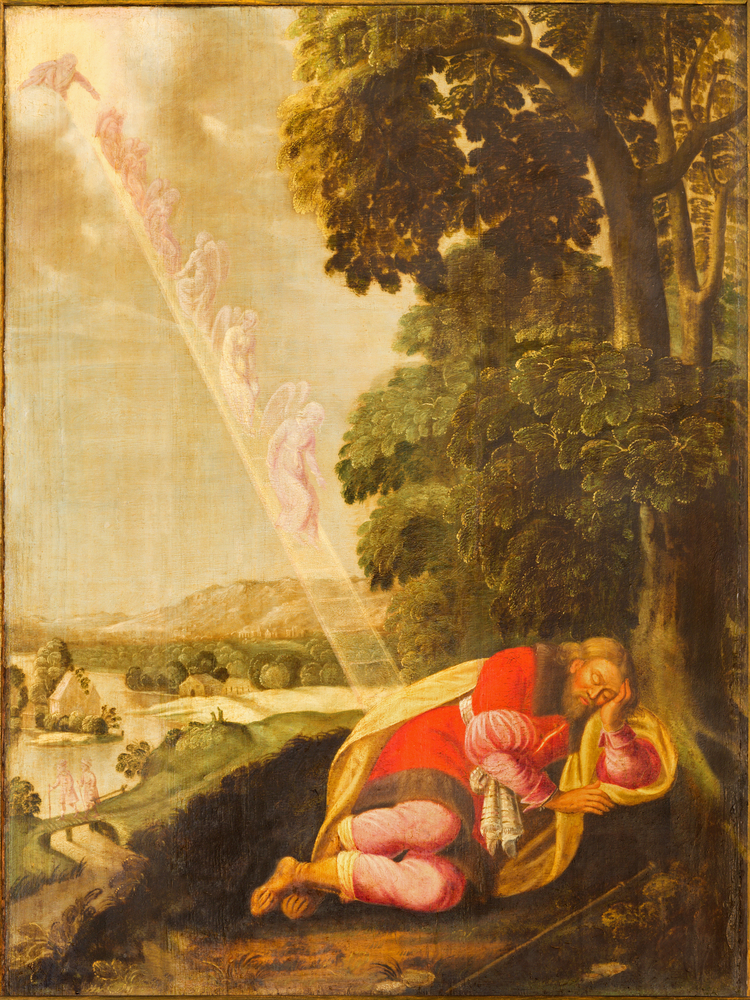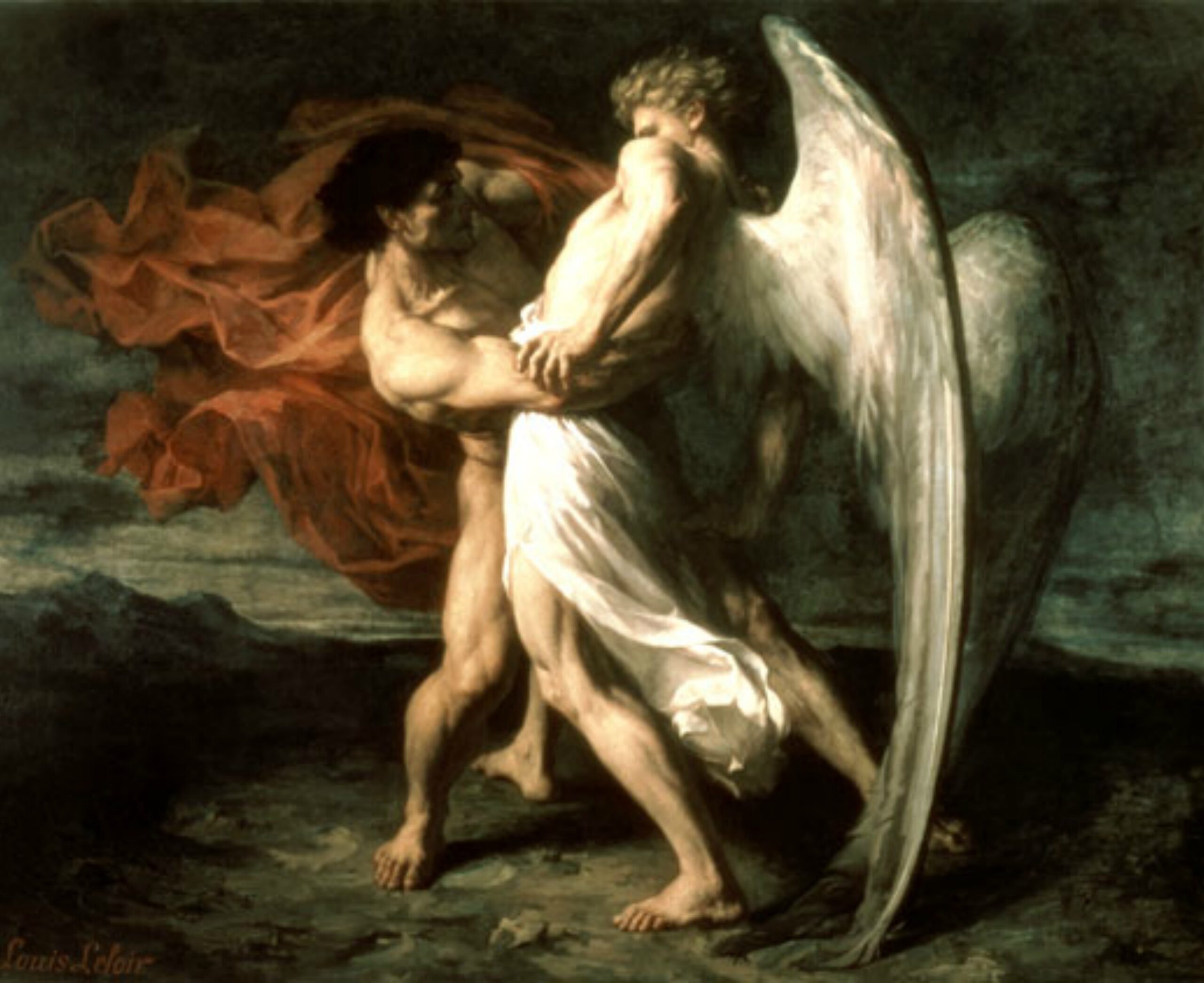“He prayeth best, who loveth best
All things both great and small;
For the dear God who loveth us,
He made and loveth all.” – Samuel Taylor Coleridge’s The Rime Of The Ancient Mariner

Bethel had a humble beginning. Nothing about that patch of earth gave anyone any reason to suppose it was any more sacred than any other patch of God’s earth. We’re therefore well disposed to excusing Jacob’s appeal to ignorance:
“…Surely the LORD is in this place; and I knew it not.”[1] Genesis 28:16
That piece of earth would later become a holy place thanks to Jacob’s dream of angels ascending and descending a ladder. But before Jacob’s revelation and for about 400 years afterwards, it was just a piece of earth. Merchants and travellers, great and small, led their camels, horses, donkeys and other beasts of burden along that path on their journeys to wherever trade and fate called to them. The beasts and their owners, would have urinated, defecated and answered to whatever nature demanded of them on that piece of earth.
Humankind needs a change in outlook.
Some wayfarers would have even slept there as Jacob did, but without the divine visitation that revealed the sacredness of Bethel. To them it was just a place like any other.
However, it was where Jacob began his journey to conversion. Decades later, God would instruct him to return to that spot and build an altar unto Him.[2]Genesis 35:1 All that men and beasts did on that land before Jacob’s dream and in the intervening period before his return visit did not detract from the holiness of Bethel.
There is something about the ordinariness of Bethel that offends our sense of the sacred. For the first millennium of God journeying with the children of Israel, the Almighty, the Most Holy, lived in a booth. David thought that was wrong all day long. The God of Heaven and Earth ought only ever to live in, (in David’s words) a ‘magnifical’ [3]1 Chronicles 22:5 edifice. God acknowledged that David’s heart was in the right place. Nonetheless, He gave David a mild rebuke for his carnality:
“Wheresoever I have walked with all Israel, spake I a word to any of the judges of Israel, whom I commanded to feed my people, saying, Why have ye not built me an house of cedars”[4]1 Chronicles 17:6
Talk about the Immanence. The Most Holy took on flesh and blood and entered into time. There was nothing grand about the advent. There was no room in a decent place for His birth. Born in a sheepcote, heralded by shepherds, His bed was a long, narrow container open at the top for animals to nibble grass or slake their thirst. Not only was the Most Holy born in the most ordinary of places, He made the most ordinary place most holy – as shepherds, Magi and angels came there to worship!
Millennia after Jacob’s revelation, we would say of the sheepcote:
“…Surely the LORD was in this place; and we knew it not.”
It doesn’t end there though. How about the Most Holy Himself? Isaiah said of him:
“For he shall grow up before him as a tender plant, and as a root out of a dry ground: he hath no form nor comeliness; and when we shall see him, there is no beauty that we should desire him. He is despised and rejected of men; a man of sorrows, and acquainted with grief: and we hid as it were our faces from him; he was despised, and we esteemed him not.”[5]Isaiah 53:2-3
If we learned to treat creation as sacred, each other as holy, things great and small as divine, healing will come to the world.
The despised and rejected man was hounded to death. Not satisfied with his execution, the world went after his legacy. To this end, Saul of Tarsus committed himself. With the zeal of an ignoramus, he persecuted his saviour. He did not discern holiness in the ministry of an executed carpenter. Saul became Paul on the road to Damascus when the blinding light of God broke through the darkness in which religion trapped him. He learned a lesson and did his best to teach others that we are more than the sum of our flesh and blood:
“Wherefore henceforth know we no man after the flesh: yea, though we have known Christ after the flesh, yet now henceforth know we him no more.”[6] 2 Corinthians 5:16
More often than not, Holiness is all around, hidden in plain sight. In the Jewish Apocrypha Tobit, Azariah, the son of Hananiah the great, turned out to be the angel Raphael.[7]Tobit 5:18 God’s glory is to be found in places we wouldn’t think to look and in those who don’t command our attention or regard. The Prophet Isaiah was at pains to communicate this mystery to the world. In Isaiah 6:3 he says the whole earth is full of God’s glory. The whole earth, not just Jerusalem or Mecca or Mount Sinai or St whatever Cathedral. The whole world is full of God’s glory. It wasn’t the burning bush whose leaves were not consumed that made the ground on which Moses stood holy. The place was always holy, but no one knew. It took a pyrotechnic to draw Moses’ and our attention to the holiness of Sinai.
If we learned to see God in creation and His glory in all his works, there will be a revival. If we learned to pray for one another out of a sincere heart, our differences not withstanding, God’s supernatural force will take over and row back our drift.
Scripture’s silent voice has been screaming unheard, unheeded, unacknowledged. Everyday, all day long, we miss out on opportunities to engage the sacred and connect with heaven. This eternity of unknowing has exposed creation to avoidable pain and sorrow. Nothing captures it better than Samuel Taylor Colleridge’s The Rime of the Ancient Mariner.
A few sailors who set sail on a voyage suddenly realise an albatross has come along for the ride. A superstitious few think the albatross brings good fortune. Others say it’s just a bird. One of them, the Mariner, thinks very little of animals. He takes it upon himself to end the jaw-jaw by shooting the albatross with a crossbow. At first, all is well. Afterwards, the ship is thrown off course and everyone blames the Mariner for blowing their luck. One by one the sailors die, save the Mariner, left alive to be redeemed by guilt and suffering. The experience sanctifies him. He finds himself praying for creatures he once dismissed as ‘slimy things’. With his penance and prayers, the dead sailors are revived and a supernatural force takes over the ship and brings it to land.
The Prophet Hosea says the world suffers because of our cruelty to one another. Humankind needs a change in outlook. If we learned to treat creation as sacred, each other as holy, things great and small as divine, healing will come to the world. If we learned to see God in creation and His glory in all his works, there will be a revival. If we learned to pray for one another out of a sincere heart, our differences not withstanding, God’s supernatural force will take over and row back our drift.


